
June 15, 2016 • No. 19 | PDF Previous Issues
Parliamentary Committee Conducts Study of Temporary Foreign Worker Program
Abolish the Temporary Foreign Worker
Program — Rights and Status for All
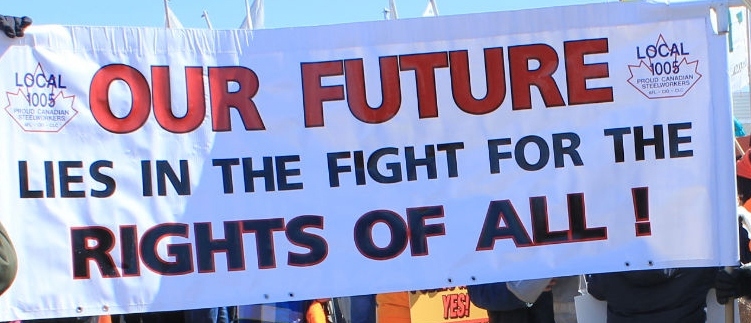 The House of Commons Standing Committee on Human Resources, Skills and Social Development and the Status of Persons with Disabilities (HUMA) is conducting a study of the Temporary Foreign Worker Program (TFWP).[1]
The House of Commons Standing Committee on Human Resources, Skills and Social Development and the Status of Persons with Disabilities (HUMA) is conducting a study of the Temporary Foreign Worker Program (TFWP).[1]
The Canadian state has always employed divide and rule tactics to split the working class using racism and other vile methods to create vulnerable strata of workers and attack the rights of all. Apologies for past state-organized racist attacks like the Komagata Maru incident do not absolve the state for the crimes of today’s state-organized racism and divisive tactics such as the Temporary Foreign Worker Program (TFWP). The Marxist-Leninist Party upholds the view that all workers comprise one undivided class with equal rights for all. The Party calls on all Canadians to unite and fight to abolish the TFWP and all such programs that create strata of vulnerable workers deprived of rights, which assault the dignity of the working class and weaken the rights of all.
As far as the working class is concerned, the issue of the Temporary Foreign Worker Program (TWFP) and similar schemes has been decided. They have no place in modern Canada and should be abolished. Those who own and control great social wealth and the governments in their service hold an opposing backward view. They contend workers should have no rights either as human beings or the producers of wealth. For those in control of the state and social wealth and property, the working class represents not the creator of all new value but a cost to them that diminishes their profits. Trampling on workers’ rights is their pragmatic unprincipled policy to drive down the overall standard of living and concentrate social wealth in the hands of a few.
Workers Add Value When They Work; They Are Not a Cost to the Economy or Anyone
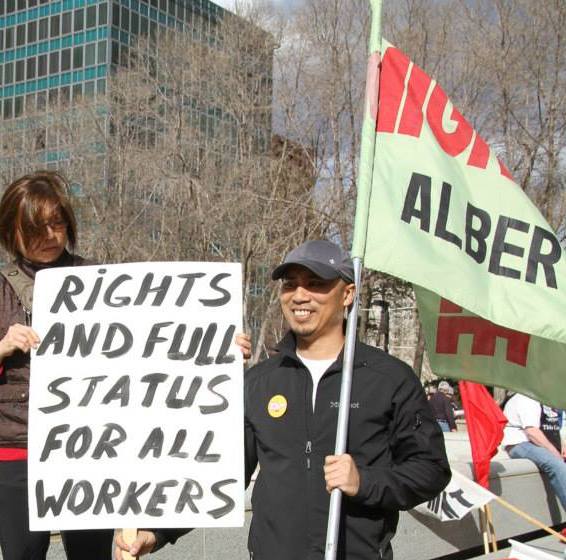 The Workers’ Opposition and Marxist-Leninist Party reject with contempt the anti-worker outlook of the ruling elite. How can workers who produce all the goods and services be considered a cost to the value they produce within the economy? Without workers working no value is produced. Social wealth does not fall from the skies or grow on trees; it comes from work. While working, workers reproduce their own value, which adds value to the economy and costs those who own and control the means of socialized production nothing. Only an outmoded sense of class privilege and entitlement to steal what belongs to workers by right can drive those who own and control social wealth and property to consider such anti-human conceptions.
The Workers’ Opposition and Marxist-Leninist Party reject with contempt the anti-worker outlook of the ruling elite. How can workers who produce all the goods and services be considered a cost to the value they produce within the economy? Without workers working no value is produced. Social wealth does not fall from the skies or grow on trees; it comes from work. While working, workers reproduce their own value, which adds value to the economy and costs those who own and control the means of socialized production nothing. Only an outmoded sense of class privilege and entitlement to steal what belongs to workers by right can drive those who own and control social wealth and property to consider such anti-human conceptions.
No individual or public authority has the right to deny workers their rights and abuse them as a cost or lesser human being. As the actual producers of all social wealth, workers deserve the dignity and distinction of their crucial social and economic position and should in fact rise to the historic conditions and become the social class that controls production in conformity with the modern socialized productive forces.
No individual or public authority has the right to split the working class and declare certain workers are lesser human beings with fewer rights. The undivided working class as the producer of all social wealth has the right to determine the direction of the economy and politics including such important matters as immigration. The undivided working class has the right to deprive those in government or elsewhere in the state and economy of their power to deny the rights of any section of the working class. An attack on one is an attack on all and will not be tolerated!
Abolish the Temporary Foreign Worker Program and Other Anti-Worker Programs
To suggest as certain owners of social wealth and public authorities do that in the 21st century it is permissible to indenture workers to an employer, to prohibit family reunification, or to pit worker against worker in order to impose a low wage agenda is obscene. Such views and pragmatic policies including the TFWP show that the working class must step up its organizing to defend the rights of all and develop its own independent politics, outlook, theory, defence organizations and Party to put the country on a new direction towards a modern Canada.
From the time people arrive in Canada to work, their rights must be recognized and upheld. The Workers’ Opposition and Marxist-Leninist Party reject the neo-liberal demand to put decisions about immigration and the conditions under which workers come to Canada directly under the dictate of those who own and control social wealth and their monopolies. The Workers’ Opposition and Marxist-Leninist Party find retrogressive and unacceptable the demand of monopoly right to control decisions about who can immigrate and stay in Canada sidelining any public authority and considerations of the public interest and nation-building. Monopoly right cannot be allowed to enforce its dictate in modern Canada on any matter. All divisive and anti-social programs such as the TFWP must be replaced with a modern immigration system that upholds the rights and status of all and serves the public interest, nation-building and Canada’s international obligations.
Note
1. The HUMA Committee has ten members: six Liberals, three Conservatives and one NDP MP. The Committee is chaired by Liberal Brian May, with two co-chairs, Conservative Bob Zimmer and New Democrat Nikki Ashton. The other members are Gerard Detell (C), Wayne Long (L), Yves Robillard (L), Dan Ruimy (L), Ramesh Sangha (L), Filomena Tassi (L), and Mark Warawa (C).
Attempts to Provide Legitimacy for Neo-Liberal Restructuring
– Peggy Askin –
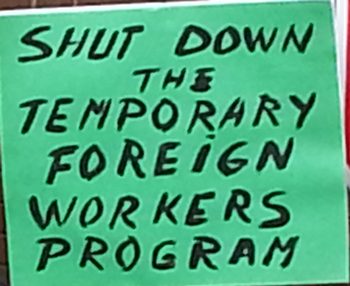 The HUMA Committee hearings on the Temporary Foreign Worker Program began May 11, and heard witnesses over five sessions, the final one on June 1. Many sessions were cut short so that members could attend votes in the House. Only ten hours in total were devoted to hearing witness statements and the Q&A that follows each panel. In all, 50 people testified representing 26 organizations, two government departments and four people speaking as individuals. Each witness was given about seven minutes to provide information to the Committee. Employers and their organizations dominated the proceedings. The Committee began consideration of the draft report at its June 13 meeting and is expected to issue its final report before the end of June.[1]
The HUMA Committee hearings on the Temporary Foreign Worker Program began May 11, and heard witnesses over five sessions, the final one on June 1. Many sessions were cut short so that members could attend votes in the House. Only ten hours in total were devoted to hearing witness statements and the Q&A that follows each panel. In all, 50 people testified representing 26 organizations, two government departments and four people speaking as individuals. Each witness was given about seven minutes to provide information to the Committee. Employers and their organizations dominated the proceedings. The Committee began consideration of the draft report at its June 13 meeting and is expected to issue its final report before the end of June.[1]
An inquiry worthy of the name would have begun by acknowledging that the responsible public authority must end the preferred policy of the rich to create a stratum of vulnerable workers in order to attack those workers and extend it to an attack on the rights of all. A proper inquiry would fully investigate the conditions of the vulnerable workers in the TFWP and other programs such as the International Mobility Programs (IMPs). The collusion of the federal government and Canadian employers in permitting labour trafficking also needs to be fully investigated and redress provided for the victims. The manner in which the TFWP has been used by employers to drive down wages and working conditions is also an important area of investigation, as well as whether employers continue to act with impunity to violate the conditions under which they are legally permitted to hire temporary foreign workers.
The inquiry to date shows that the Liberal government’s intention is not to conduct a serious study. Further, the Liberal government, which controls the Committee, ignored the IMPs under which the majority of temporary foreign workers in Canada are working. In light of all this, people should remain vigilant about what the Liberals are up to and draw warranted conclusions.
Committee Co-Chair Nikki Ashton (NDP, Churchill-Keewatinook-Aski) expressed her concerns about the way the study is being conducted saying, “Temporary foreign workers come to Canada to pick our food, take care of our kids, serve in our restaurants, and run our economy. They are exploited because of the system that we created.
“Despite the pronouncement of the Minister to bring clarity, focus, and accountability to the program, our study in the Human Resources Committee only has six sessions to hear from witnesses and there is no explicit focus on the area where abuse is rampant ”
Ashton also stated that the committee has been given no proper ability to look at the Seasonal Agricultural Worker Program. Ashton said the TFWP has been a source of much scandal and shame in the way that temporary foreign workers have been treated adding, “The Liberal government must make this review more than a public relations exercise and take key steps to end the injustices that take place on our watch every day.”
The Canadian Labour Congress (CLC) also expressed concern, noting that the 2014 CLC Convention passed a resolution calling for “a full, open and transparent review of the Temporary Foreign Worker Program.” CLC Secretary-Treasurer Barb Byers stated that the review does not meet these criteria.
The Coalition for Migrant Workers Rights Canada issued an open letter calling for a comprehensive review, with the goal of establishing permanent residency rights, family reunification, full social entitlements and labour protections for all migrant workers. The Coalition called for migrant worker representation in the development of the structure, scope and timelines of the review, for hearings to take place across the country, and to ensure that migrant workers could speak freely in their own languages and with protection from employer reprisals or being targeted by immigration enforcement.
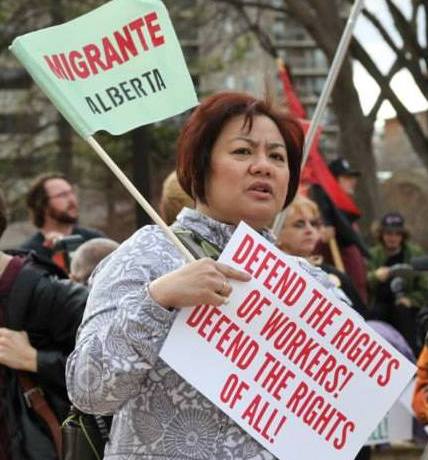 Gil McGowan, President of the Alberta Federation of Labour (AFL) told Renewal Update that the AFL’s repeated requests to address the Committee’s hearings have been denied. The AFL has extensive knowledge about the program having carried out much research on the issue as well as running an advocacy program for migrant workers for several years. The AFL calls for the TFWP to be scrapped and has taken the stand that the program’s attack on vulnerable migrant workers is part of the agenda to drive down wages and attack the rights of all.
Gil McGowan, President of the Alberta Federation of Labour (AFL) told Renewal Update that the AFL’s repeated requests to address the Committee’s hearings have been denied. The AFL has extensive knowledge about the program having carried out much research on the issue as well as running an advocacy program for migrant workers for several years. The AFL calls for the TFWP to be scrapped and has taken the stand that the program’s attack on vulnerable migrant workers is part of the agenda to drive down wages and attack the rights of all.
The Liberals’ negative response to the broad call for a serious, full and public inquiry shows contempt for the deep concerns of Canadians, including unions, migrant workers’ organizations and advocates, academic researchers, and human rights organizations. Instead, the inquiry reeks of class privilege, dominated by private interests given a platform to push their neo-liberal agenda demanding the state act to make the monopolies competitive internationally and use the TFWP to achieve this aim. All this suggests that the real intention of the inquiry is to provide legitimacy for the neo-liberal restructuring of immigration where monopoly right exercises its dictate over the Canadian immigration system.
Note
1. The dismissive attitude of MPs towards one of the most vulnerable sections of temporary foreign workers was brought to light by the experience of a worker in Toronto who tried to testify before the Committee. Teta Bayan works as a nanny in the North York area of Toronto. Such caregivers in the TFWP are subjected to a totally unacceptable situation in which they are dependent on their employers for their ability to live in the country and are forced to accept any abuses lest they be sent home. An organization advocating for migrant workers invited Bayan to testify before the Committee on their behalf but after having to wait to speak after the time slots allocated to private business interests she was then denied the opportunity after the Committee session ended earlier than scheduled. The Globe and Mail explains:
“Ms. Bayan, who makes $11.25 an hour, is on call during all her waking weekday hours, as are most nannies in the temporary foreign worker program.
“However, Ms. Bayan knew there were very few migrant workers slated to speak to the committee and that no nannies have testified about their working conditions.
“‘I wanted to speak to them directly,’ she said. ‘Now that they’re planning to review the program, we wanted to be a part in how they shape the laws for the migrant workers.’
“Ms. Bayan talked her employers into the plan, finding another woman to replace her on Wednesday afternoon and also promising to work extra hours later to make up for it. After staying up until 2 a.m. writing her speech, she travelled on Wednesday to the downtown Toronto office of the Migrant Workers Alliance for Change, where she waited to speak by video link.
“Among other things, she planned to tell the committee about withheld wages, including a nanny who was paid only $2,100 for two years of work.
“She wanted to explain how drastically the workers will risk their own health to avoid displeasing their employers, on whom they are dependent at first for their status in Canada. One migrant agricultural worker miscarried because she tried to hide her pregnancy, Ms. Bayan said. […]
“Ms. Bayan planned to urge the committee to give migrant workers more independence — permanent residency or at least open work permits — and therefore more negotiating power over their working conditions.
“As she waited, business owners spoke first, and then committee members left for a half-hour break to attend a vote in the House of Commons. Ms. Bayan was told she would speak after they returned.
“But the break stretched on. Finally she realized no one would be returning. […]
“‘I don’t think I would be able to get an afternoon off again,’ she said. […]
“Confused, she started to pack up her things. Then she learned why the meeting had been postponed. After the Prime Minister grabbed the Opposition Whip and jostled NDP MP Ruth-Ellen Brosseau in the process, other MPs had started yelling, and accusations flew back and forth for hours.
“‘I was overwhelmed to hear leaders doing those kind of things, and very frustrating that they put us on hold because of [it],’ she said. […] ‘I was there, I prepared, and then to find out they adjourned the meeting because, you know, they were fighting, is very shameful, honestly.'”
International Mobility Programs —
The Hidden Temporary Foreign Worker Programs
– Peggy Morton –
In its study of the Temporary Foreign Worker Program (TFWP), the Standing Committee on Human Resources, Skills and Social Development and the Status of Persons with Disabilities (HUMA) on May 11 and again on May 30, heard from senior officials in the departments associated with the program. The officials informed the committee that the use of the TFWP is declining, from roughly 200,000 workers in 2012 to 90,000 approved positions in 2015. This conclusion covers up the actual situation, which the officials themselves implied with additional information. They told the committee that only about 30 per cent of all foreign workers in Canada are admitted through the TFWP, while 70 per cent are in Canada through one of the International Mobility Programs (IMPs).
The number of workers employed through IMPs has grown from 74,000 in 2005 to 260,000 in 2014. The IMPs do not require a labour market opinion so employers do not need to show that they have made any effort to hire Canadian residents or citizens. Also, no requirement exists that those working under an IMP be paid the regional standard wage for their occupation. Some workers in these programs are tied to their employer, while others have an open work permit. The Committee is not studying the IMPs and very little public information about them is available.
Taken altogether, the Temporary Foreign Worker Program, the International Mobility Programs and the Seasonal Agricultural Worker Program employ close to 400,000 workers, but most of these workers are not even included in the Committee’s study.
According to the government’s Citizenship and Immigration Canada “Facts and Figures 2014,” the number of temporary foreign workers (TFWs) with a valid permit present in Canada peaked on December 31, 2009 at 112,563. A rapid decline occurred due to the economic crisis that gripped the country but also possibly from the switch to other programs due to the mounting opposition to the TFWP and its blatant abuses. The decline in numbers after the crisis bottomed out at 86,692 TFWs in Canada on December 31, 2012 and has since risen to 94,109 on December 31, 2014, the last time figures were published.
In contradiction with the overall figures, senior government officials suggest that the decline in the number of TFWs from 2009 to 2014 signals a decrease in the use of migrant workers and that the abuse of temporary foreign workers is ending. But the number of workers coming under the IMPs has matched or exceeded the decline under the TFWP. Also, senior officials appear to be arguing that the issue is not injustice and the principle that no workers should be abused or denied their rights but simply the quantity of abuses.
The reported numbers and their interpretation are in dispute. This raises a serious question about what is being hidden and why. Could it be that the Liberals are continuing the previous Conservative government’s practice of manipulating the numbers — assisting private business interests in moving whole categories of temporary foreign workers from the TFWP to the IMPs to continue the general practice but blunt the opposition and split the working class?
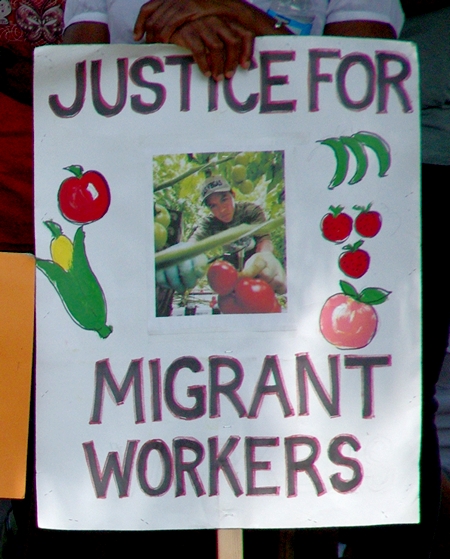 Another sleight of hand in the government’s bag of tricks is that workers in the Seasonal Agricultural Worker Program (SAWP) are not included in the annual reports of the number of temporary foreign workers working in Canada. All workers in this program must leave Canada by December 15 and cannot return before January 1, but the annual count of temporary foreign workers is made each year as of December 31. In 2013, there were 41,700 workers in Canada under the SAWP.
Another sleight of hand in the government’s bag of tricks is that workers in the Seasonal Agricultural Worker Program (SAWP) are not included in the annual reports of the number of temporary foreign workers working in Canada. All workers in this program must leave Canada by December 15 and cannot return before January 1, but the annual count of temporary foreign workers is made each year as of December 31. In 2013, there were 41,700 workers in Canada under the SAWP.
Leaving out of the study workers under the IMP and SAWP creates a completely false picture of foreign workers working temporarily in Canada. For example, the Committee was informed by a senior official that resorts like Whistler are now using the International Experience Program in place of the TFWP. Once a modest reciprocal program to enable young people from 18 to 35 to spend a year in Canada working and travelling, the International Experience Program has ballooned from 16,378 youth in 2002 to 59,338 in 2014 creating yet another pool of cheap workers. Reciprocal agreements exist with most countries in Europe, as well as Ukraine, Japan, Taiwan, south Korea, Australia, New Zealand, Mexico, Costa Rica and Chile.
Additionally, close to 100,000 more workers are working in Canada today under the “competitiveness and public policy” category than in 2005. This includes spouses of skilled foreign workers; spouses of TFWs who have received a bridging permit; spouses of provincial nominee work permit holders; spouses of international students; post-graduate work permit holders, and post-doctoral fellowships. This exposes further discrimination against workers in the low-wage/low skill category under the TFWP as they are not permitted to bring their families with them to Canada.
A category of migrant workers called “significant benefit to Canada” has grown from 9,330 in 2005 to 34,447 in 2014. This includes intra-company transfers that allow global monopolies to transfer staff to Canada from other countries where the monopolies operate, and a category, “significant benefit — general,” which includes “work permit holders with Open Authorizations who have applied for permanent residency.”
The huge expansion of programs in which employers are not required to even post a job or take applications from Canadian workers, and in which no requirement exists to pay the regional prevailing wage rate is of great concern to Canadians.
The HUMA study loses all credibility when it leaves out 70 per cent of foreign workers working temporarily in Canada. It raises serious questions of the intention of the Minister of Employment, Workforce Development and Labour, MaryAnn Mihychuk, who has stated that the government is considering a “path to permanent residency” for temporary foreign workers, not an end to all programs designed to create vulnerable strata of workers whose rights are denied, and to privatize immigration even further than the previous government.

